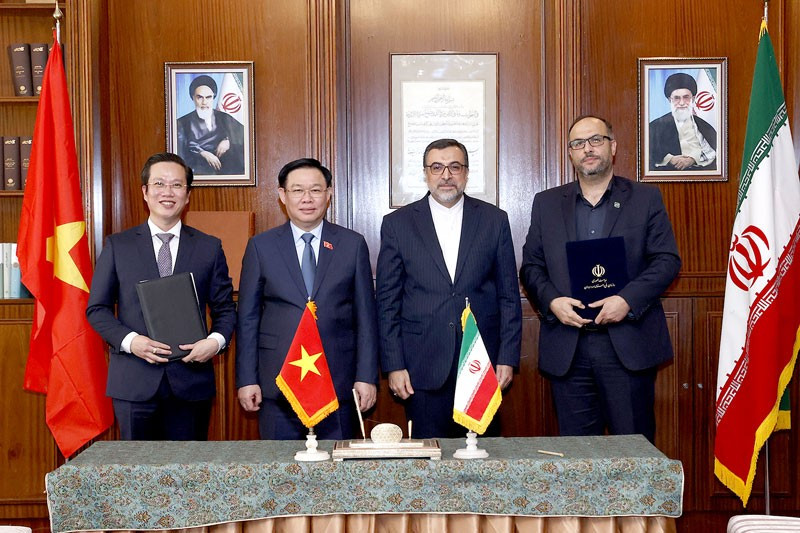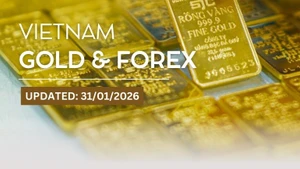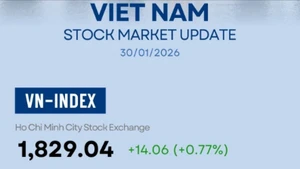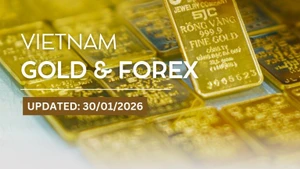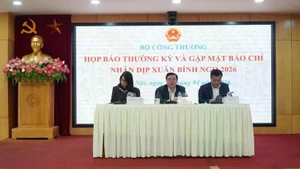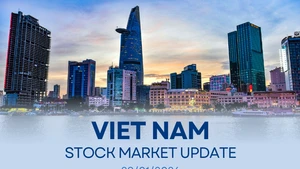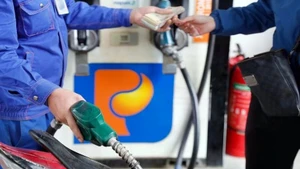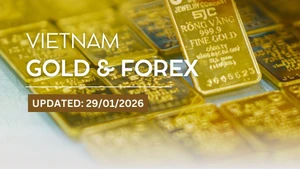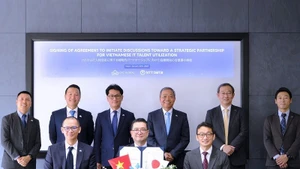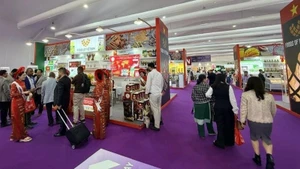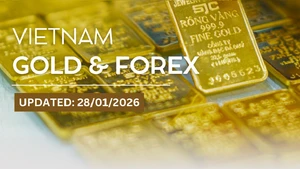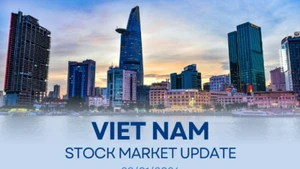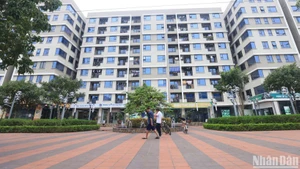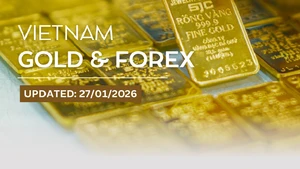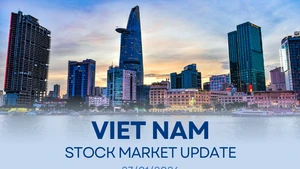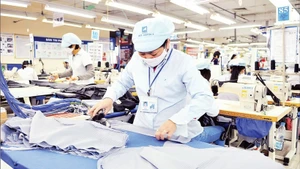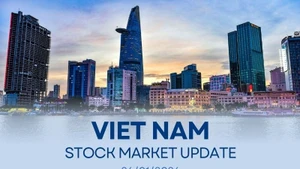This technical cooperation is expected to contribute to promoting economic-trade relations and the friendship between the two countries in the near future.
Towards the signing of new cooperation agreements
The signing ceremony of the memorandum of understanding (MoU) took place solemnly in the presence of NA Chairman Vuong Dinh Hue and Deputy Foreign Minister of Iran Mohammad Hassan Sheikholeslami.
Ha Minh Hiep, Deputy Director General in charge of the Directorate of Standards, Metrology and Quality, and Hassan Khanezar, President of the Iran National Standards Organisation, represented the two agencies in signing the MoU.
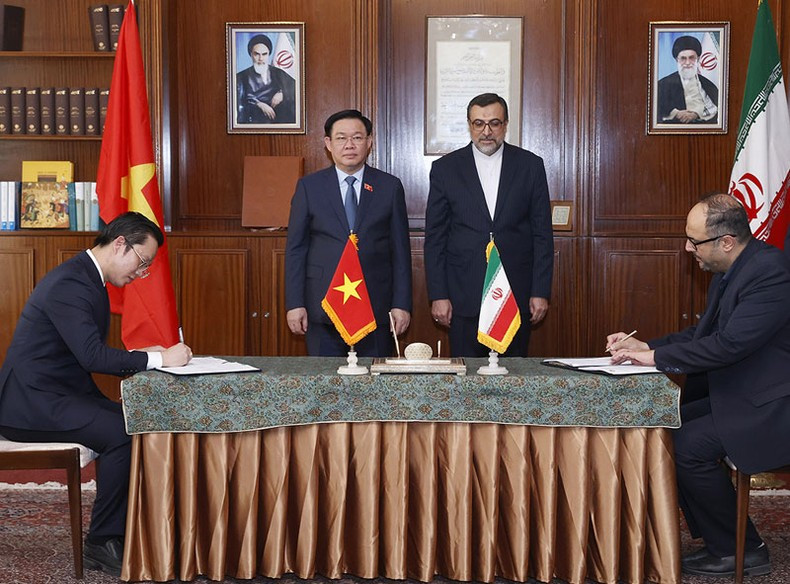 |
| Deputy Director General in charge of the the Directorate of Standards, Metrology and Quality, Ha Minh Hiep, and President of the Iran National Standards Organisation, Hassan Khanezar, sign the MoU on the cooperation between the two agencies. (Photo: Vu Tu Quyen) |
The signed bilateral MoU is an important basis for the two sides to implement practical cooperation activities in the coming time, especially activities related to training and the sharing of experience in management of the standardisation and assessment of the conformity of Halal products, towards the signing of mutual recognition agreements among conformity assessment organisations for Halal products.
Halal products consist of almost all essential goods in daily life, including beverages, organic food, pharmaceuticals, and cosmetics, as well as those in service areas, such as banking, tourism, security, education-training, and hotel.
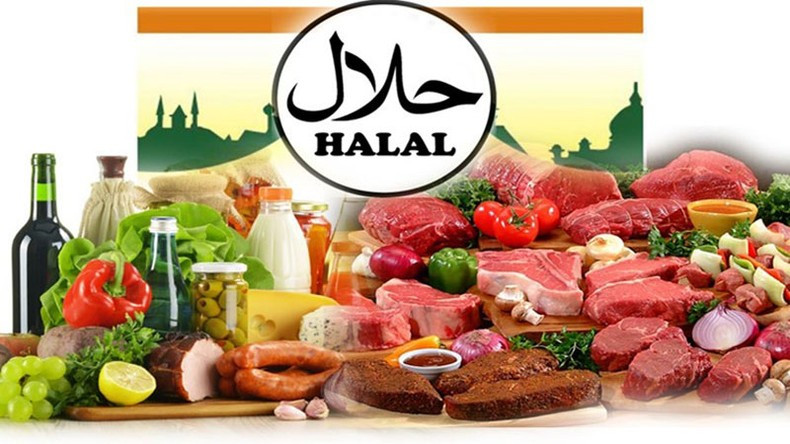 |
| The main Halal products |
Earlier this year, the Prime Minister issued a Decision approving the project on “strengthening international cooperation to build and develop Halal industry in Vietnam until 2030”.
Talking to a reporter of Nhan Dan Newspaper accompanying the NA Chairman during the visit to Iran, Ha Minh Hiep said: “This is the first project that sets out major national orientations on mobilising domestic and international resources to build and develop Vietnam's Halal industry in a methodical, professional, and comprehensive manner, thus helping Vietnamese enterprises to participate deeply and effectively in the global Halal production and supply chains.
Opening the potential Halal market
According to Ha Minh Hiep, the project creates a new direction in promoting international economic integration, opens a potential Halal market with a scale of up to 10 trillion USD worldwide in 2028, and boosts new impetus for Vietnam’s sustainable economic development in the context that traditional markets face many difficulties due to inflation, economic recession, increased technical barriers, etc.
Ha Minh Hiep, Deputy Director General in charge of the Directorate of Standards, Metrology and Quality, noted that along with the Government's orientation, the export market of Halal products in Vietnam has made great progress recently, attracting the attention of businesses. Vietnam's Halal products are quite diverse, including meat, poultry, seafood, nuts, food processing products, cosmetics, pharmaceuticals, and many other fields. This creates favourable conditions for the exports of Halal products from Vietnam to the markets of Muslim countries.
Among the countries with great potential to import Halal products from Vietnam, the Islamic Republic of Iran, one of the major countries in the Middle East, has been becoming an attractive destination for international businesses in the field of Halal products. With a population of more than 83 million and almost 99% of the population following Islam, the Halal market in Iran has been expanding and becoming increasingly promising for traders and manufacturers.
Strict Halal regulations have become an integral part of Iranian people, from food to cosmetics, pharmaceuticals, fashion, hotel services, and restaurants.
This creates favourable conditions for the Halal market to develop strongly and become more attractive to international traders.
The main Halal products in the Iranian market include foods such as cattle meat (except pork), poultry products, fish, nuts, and processed foods. In addition, Halal cosmetic and pharmaceutical products are also attracting the attention of the Iranian people.
Halal products not only ensure safety and compliance with Halal regulations, but must also be of high quality and meet the diverse needs of consumers.
To meet the needs of the growing Halal market, Iran imports Halal products from many countries around the world such as Saudi Arabia, the United Arab Emirates (UAE), Oman, and Malaysia, Indonesia, Turkey, Pakistan, and Bangladesh.
The diversity and tendency to import from various sources have contributed to the abundance of the Halal market in Iran. However, when businesses export Halal products to the Iranian market, they need to meet several barriers and requirements of local authorities.
Ha Minh Hiep, Deputy Director General in charge of the Directorate of Standards, Metrology and Quality
With great development potential and growing trend of Halal product users, the Halal market in Iran is becoming an attractive destination for international businesses, including Vietnam.
“However, in order to overcome barriers and succeed in exporting Halal products to this market, Vietnamese businesses need to strictly comply with the regulations and requirements of the host country. Understanding and respecting the indigenous Muslim culture also plays an important role in building sustainable business relationships”, said Deputy Director General Ha Minh Hiep.
Promoting opportunities for bilateral cooperation
The Iranian Government has applied many preferential policies to promote the import of Halal products into the country.
The programmes to encourage investment, reduction of import taxes, infrastructure improvement and promotion of international economic cooperation have been facilitating Vietnamese businesses to access the Iranian market.
Standards and quality are important and effective tools to bring Vietnam's Halal products to the world market, including Iran.
“Currently, Vietnam is gradually perfecting the Halal standard system on the basis of harmonising with the Halal standards of Muslim countries that are the main export markets of Vietnamese enterprises,” added the Deputy Director General in charge of the Directorate of Standards, Metrology and Quality.
He also said that the Directorate of Standards, Metrology and Quality is urgently researching and coordinating with ministries, agencies, localities, and related organisations to develop a project to establish a National Halal Certification Centre to promote Halal certification activities in Vietnam.
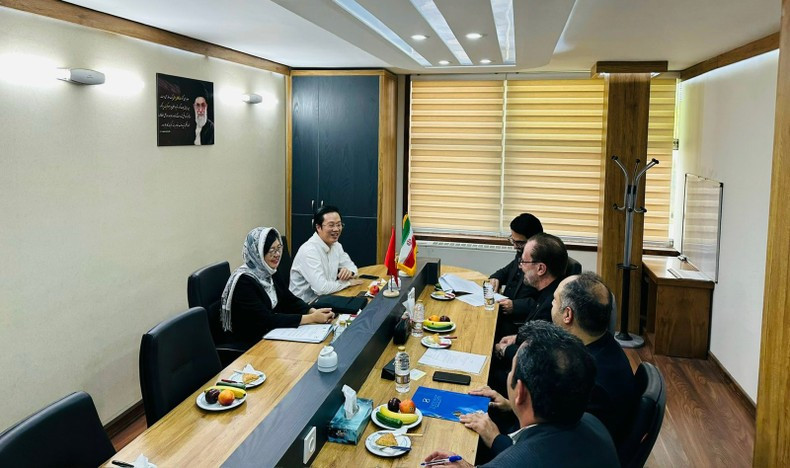 |
| Leaders of the Directorate of Standards, Metrology and Quality hosts a meeting with Iranian partners and agencies during the official visit to Iran by NA Chairman Vuong Dinh Hue. (Photo: Vu Tu Quyen) |
The completion of the standard system and the formation of a national Halal certification body are important technical measures to bring Vietnam's Halal products to better access to the global Halal market in general and the Halal market in Iran in particular, contributing to increasing the values of Vietnam's agricultural product chain.
It is known that the Iranian government has applied many preferential policies to promote the export of Halal products to the country.
Programmes to encourage investment, reduction of import taxes, infrastructure improvement, and promotion of international economic cooperation have been facilitating Vietnamese businesses to access the Iranian market.
To date, the Ministry of Science and Technology has published five relevant Vietnamese Standards including TCVN 12944:2020 on Halal foods - General requirements, TCVN 13708: 2023 on Good agricultural practice for establishments halal production, TCVN 13709:2023 on Halal animal feed, TCVN 13710:2023 on Halal food - Requirements for animal slaughter, and TCVN 13888:2023 on Requirements for Halal certification body. The Ministry is currently also continuing to research and develop new Vietnamese standards for other potential Halal products such as cosmetics, pharmaceuticals, textiles, tourism services, hotels, and restaurants.
